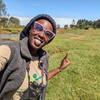In September and October 2023, i along with my field assistant, trained school students, youth and community members as citizen scientists on how to use appropriate smartphone applications for biodiversity data collection. This project aims to enhance the involvement of citizen scientists in biodiversity data collection, monitoring and conservation efforts.
The community
The community members already possess awareness and local knowledge about biodiversity and recognizes the value of their natural resources. To find suitable smartphone applications for data collection, we initially explored various options, starting with Kobo Toolbox, but determined that it wasn't a good fit for their needs. Although they are familiar with biodiversity using local names, they were unsure how to contribute data. To address this, I introduced them to iNaturalist. I guided them in downloading the app onto their phones, setting it up, and demonstrating how to use it to collect data effectively and contribute to the iNaturalist database
Youth in Schools- Kibengu secondary school in Usokami Village was visited, Students were able to add their knowledge and skills about environment and wildlife. They are keen and asked interesting questions. Followed with short walk around school surrounds to identify various wildlife species.
In the "Training Youth as Citizen Scientists" program, I worked with three groups of youth. Two groups focused on the tourism sector, aiming to become future tour guides, while the third group consisted of passionate environmentalists dedicated to learning about and improving their understanding of biodiversity. Although all participants had knowledge of biodiversity and were engaged in data collection, they were unsure of where to share this information or which smartphone apps to use.
We structured the training as follows:
- Class Sessions: We explored various smartphone applications that cater to different wildlife taxa, helping participants understand which apps would be most suitable for their needs.
- App Selection: Through group discussions and consensus, we identified specific apps for data collection, Examples eBird/BirdLasser for birds, iNaturalist for plants, mammals, invertebrates, reptiles, and amphibians.
- Fieldwork: Participants conducted transects to collect biodiversity data using these smartphone apps, giving them hands-on experience.
- Sound Recording: They also learned how to set up and record bird sounds using AudioMoth, adding another dimension to their data collection skills.
Achievements of this Project:
- The trained youth are now actively engaged in creating different transects and collecting biodiversity data in their local areas on a monthly basis. This regular data collection fosters a deeper understanding of their surrounding ecosystems.
- Both the trained youth and community members have started submitting their collected data to various platforms, including eBird, GBIF (Global Biodiversity Information Facility), TBAP (Tanzania Bird Atlas Project), and iNaturalist.
- A highlight of their efforts was their participation in Global Birding Day on October 12, 2024. The efforts of these trained youth, in collaboration with other Tanzanians, helped Tanzania secure 6th place globally and the top position in Africa in the Global Birding Day challenge for the first time since the initiative began.
- The trained youth and community members are not only sharing their knowledge among themselves but are also influencing others to join their cause. They are promoting the use of smartphone apps for data collection and encouraging their peers to engage in learning and sharing their findings.
Future Plans
We are continuing our communication and may have additional training sessions next year (2025). We are addressing any challenges that come up through phone calls. I have been invited by primary schools to take part in tree planting activities and environmental education in January 2025.
I sincerely appreciate the seed grant from Arm, which contributed to the success of this Citizen Science project. I would like to extend my gratitude to Fauna & Flora International, RISE and Grumeti Fund, Wildlabs.net, my fellow Woman in Conservation Technology Tanzania cohort of 2023, and my field assistant, Morris Nyambo. I am also deeply grateful to all the participants who voluntarily attended and are now contributing biodiversity data to various databases.
I am Ester Matingisa, a wildlife conservationist and a member of the Woman in Conservation Technology Tanzania cohort of 2023.


Add the first post in this thread.